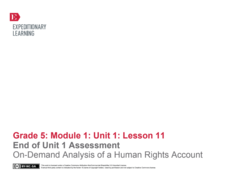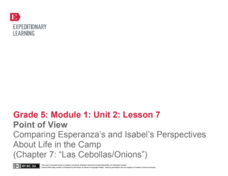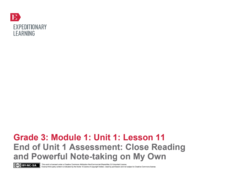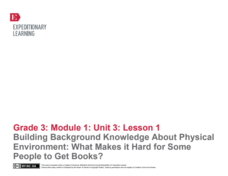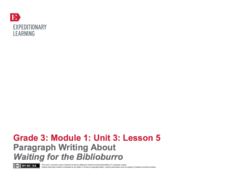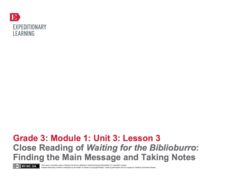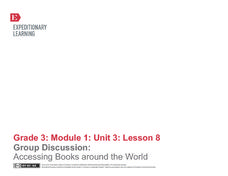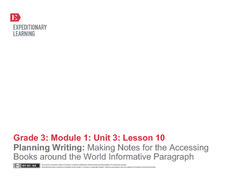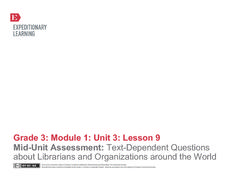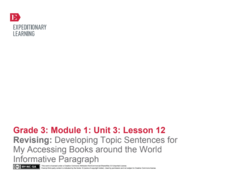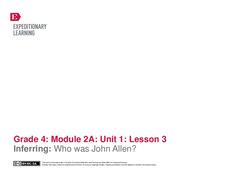EngageNY
Main Ideas in Informational Text: Analyzing a Firsthand Human Rights Account for Connections to Specific Articles of the UDHR
Lesson 10 in a series of human rights lessons focuses on the skills of finding evidence and summarizing. Your young readers work to compare the two texts they have read in this unit: the Universal Declaration of Human Rights...
EngageNY
End of Unit 1 Assessment: On-Demand Analysis of a Human Rights Account
The last instructional activity in this unit about human rights consists of a final assessment. To demonstrate the skills your class has acquired throughout this unit, they will work with a new article entitled "From Kosovo to the United...
EngageNY
Inferring About Characters Based on How They Respond to Challenges (Chapter 4: "Los Higos/Figs")
How do you know what a character's personality is like if an author doesn't tell you? With a focus on character development in Esperanza Rising, pupils complete a jigsaw activity to analyze the actions of Mama, Abuelita, and Miguel. Once...
EngageNY
Point of View: Comparing Esperanza's and Isabel's Perspectives About Life in the Camp (Chapter 7: "Las Cebollas/Onions")
Explore point of view and more with a Common Core-designed instructional activity. Learners experience different points of view by representing one of two characters from Esperanza Rising during a partner discussion. They must use...
EngageNY
End-Of-Unit 2 Assessment: On-Demand Analytical Essay About How Esperanza Changes Over Time
Close the unit on Esperanza Rising with an in-class analytic essay on how Esperanza changes over the course of the novel. Writers can use any of their notes and work from the unit as well as their drafts of the first two paragraphs of...
EngageNY
End of Unit 1 Assessment: Close Reading and Powerful Note-Taking on My Own
As the final lesson plan in a larger beginning-of-the-year unit to establish routines and teach close reading skills, this plan is designed as an assessment piece. Using the story, The Librarian of Basra, learners independently complete...
EngageNY
Research: Identifying Categories for Our Research About the Wheelwright
Here is a fine lesson plan on reading and understanding expository text designed for 4th graders. With a partner, learners read a passage of text about a machine called a wheelright. This machine was commonly used in the colonial period....
EngageNY
Independent Reading: Building The Power of Stamina
The Incredible Book-Eating Boy is read aloud to young readers, and the story is discussed. Then, the lesson goes into how to build up one's reading stamina. The class brainstorms ways that they can build up their stamina such as: staying...
EngageNY
Building Background Knowledge About Physical Environment: What Makes it Hard for Some People to Get Books?
How far would your pupils go to be able to have access to books? Revisit Heather Henson and David Small's That Book Woman and challenge class members to take on the role of Cal or the Book Woman. By putting themselves in someone else's...
EngageNY
Reading Maps: Locating the Countries We Have Been Reading About
Show your class how to read a map and decipher all of the markings and features. Start out by connecting maps to their homework from the night before and their current reading, in this case That Book Woman, and a related informational...
EngageNY
Paragraph Writing About Waiting for the Biblioburro
Ask your learners to synthesize what they know about Waiting for the Biblioburro by writing a well-organized paragraph. Young writers focus on using transition words and including specific details in their paragraphs. The plan allows for...
EngageNY
Continued Close Reading of Waiting for the Biblioburro: Comparing and Contrasting the Children in Colombia, Appalachia, Chad, and Afghanistan
Focus on similarities and differences with a jigsaw activity that requires pupils to compare Waiting for the Biblioburro to other texts they have read. To prepare, class members first respond to text-dependent questions, moving on to...
EngageNY
Close Reading of Waiting for the Biblioburro: Finding the Main Message and Taking Notes
Expose your class to Waiting for the Biblioburro, narrative nonfiction that will act as the bridge between ficiton and informational texts to come. Class members do a close reading of the text, looking at excerpts instead of the whole...
EngageNY
Group Discussion: Accessing Books Around the World
Continue work with an informational text by following the procedures detailed here. The plan, part of a series, focuses on My Librarian is a Camel. Class members complete text-dependent questions and then prepare for and participate in a...
EngageNY
Planning Writing: Making Notes for the Accessing Books Around the World Informative Paragraph
Encourage your young writers to thoughtfully plan and organize their work. First, model how this is done and vocalize your thought process as you work. Next, create a class list of strategies that they can use during independent writing...
EngageNY
Close Reading of Excerpts from My Librarian Is a Camel: How Do People Access Books Around the World?
Acquaint your class with informational text through a close reading. First, examine a couple of pages together, looking at text features and content. The whole class focuses on marking down a brief summary of each paragraph before...
EngageNY
Mid-Unit Assessment: Answering Text-Dependent Questions About Librarians and Organizations Around the World
This is a skills-based assessment that asks test takers to use textual evidence to determine the main idea of an excerpt from an informational text as well as respond to text-dependent questions. The assessment is the middle point...
EngageNY
Revising: Developing Topic Sentences for My Accessing Books Around the World Informative Paragraph
Revision is an important part of the writing process. Focus on revising topic sentences and details with the plan described here. This is part of a unit, so pupils have already filled out a graphic organizer about traveling libraries...
EngageNY
Revising: Strong Conclusions for My Accessing Books Around the World Informative Paragraph
It's important that writers leave their readers with a strong and satisfying conclusion. Help your young writers develop the skills to compose a concluding sentence with the steps outlined here. After class members have had a chance to...
EngageNY
Revising My Accessing Books Around the World Informative Paragraph for a Hook to Captivate My Reader
While this is considered optional within the unit it is designed for, pupils would benefit from the listed activities. Working on writing and revising a paragraph about librarians who travel to isolated areas, class members can add some...
EngageNY
Editing and Publishing: Accessing Books Around the World Informative Paragraph
Provide time to polish paragraphs in class. Pupils, who have been working on these informational pieces for several days now, will have a chance to check for spelling and grammar before publishing their work. Sure to be a rewarding final...
EngageNY
Close Reading of Bullfrog at Magnolia Circle: Predators and Prey
Reading is fantastic, especially when it's reading about bullfrogs. Kids get cozy with predator/prey relationships as they hone their information-reading skills. They start out as they read a portion of the text aloud, then they...
EngageNY
Using Informational Text Features and Learning Freaky Frog Vocabulary
What kind of text features help children build a strong vocabulary? Class members use text features such as headers to unpack new vocabulary words. They create vocabulary journals in which they will write what they think the definition...
EngageNY
Inferring: Who was John Allen?
Help your learners work with difficult or archaic words. A continuation of lesson two of this module, the plan here focuses on deciphering the Inventory of John Allen, in particular the unfamiliar words that make up much of the list. Add...
Other popular searches
- Writing Poetry Third Grade
- Composting Third Grade
- Third Grade Spelling Words
- Animal Habitat Third Grade
- Rent a Third Grader
- Common Idioms Third Grade
- Third Grade Art Appreciation
- Measuring Volume Third Grade
- Third Grade Editing
- Third Grade Math Assessment
- Volunteering Third Grade
- Core Knowledge Third Grade



